Author Archive
Wednesday, January 27th, 2010
Savannah Music Festival LIVE Presents: Marcus Roberts
Monday, February 8th @ 9pm
In the 100 years since jazz music became an integral part of American culture, the piano has remained fundamental to its development. There have been many great pianists whose original contributions and achievements have helped define the course of jazz, and that tradition still remains intact today. In this episode of the Savannah Music Festival LIVE, we listed to one of the most extraordinary pianists of our time, Marcus Roberts. Hear Roberts perform solo, with his trio and with a few special guests (Wycliffe Gordon, Marcus Printup and Walter Blanding) during his spring 2008 visit to the Savannah Music Festival.
North Carolina’s Contribution to Jazz
Friday, February 12th @ 9pm
Thelonious Monk’s sound is one of the most recognizable in modern jazz. An original on and off the bandstand, he launch pad of modern bebop, and also created a body of work in its own orbit. (NPR Jazz Profiles)
Sunday, February 14th @ 3pm
Feb. 6th, 2010, marks the 62nd birthday of Bob Marley. In this interview/music mix, Dred Scott Keyes speaks with Christopher Farley, author of the best-selling book, “Before The Legend:The Rise of Bob Marley.” Farley lays to waste some of the myths surrounding Marley including the fact that his father was neither white nor served as an officer in the British army.
Savannah Music Festival LIVE Presents: Battle Royale
Monday, February 15th @ 9pm
The tradition of instrumental competition on the bandstand in jazz goes back to the origins of the music. By the early 1930s, such competitive on-stage battles became known as “cutting contests,” and they almost always produced some terrific entertainment for the audience in attendance. In this episode of SMF Live, we listen to a concert we produced at the 2009 Savannah Music Festival entitled Battle Royale. It featued a variety of instrumentalists squaring off against one another, but the purpose was completely musical. Driven by the creative conception of Marcus Roberts to put two rhythm sections on stage side by side, The Clayton Brothers and the Marcus Roberts Trio provided the foundation for an explosive display of musicality featuring such artists as Wycliffe Gordon, Andre Heyward, Terrell Stafford, Scotty Barnhardt and many others.
Friday, February 19th @ 8 and 9pm
John Coltrane’s never-ending quest for musical improvement and self-awareness distinguished his playing and compositions in the ’60s. It was driven by an increasing spirituality, most potently unveiled in his 1964 recording A Love Supreme. Coltrane later created music of great turbulence and ecstasy, and he remains a powerful inspiration to artists of all disciplines. (NPR Jazz Profiles)
Other specials:
Truckin’ My Blues Away : Saturday, February 13th, 9pm: – a look at the music and musicians of the drink houses and juke joints of the rural South. Host Barry Yeoman takes us into the lives of colorful artists named Captain Luke, Guitar Gabriel, Boo Hanks, Eddie Tigner, and Little Freddie King. Working men in their 60’s, 70’s, and 80’s, who have written, sung, and played songs about their world all their lives
Saturday, February 20th @ 2-4pm
This is award-winning musical documentary is about the life of Sam Cooke- from his days in Gospel music to his triumph in R&B to his untimely demise.
On Dec. 14th, 1964, the death of Sam Cooke was broken across the world. Some saw his death as the wrath of God- and an omen- for crossing the line between gospel and R&B music. Others saw his death as a needless tragedy. Still others saw Sam’s death as an end of the road towards self-reliance and musical independence. Today, Sam Cooke remains one of America’s most influential singer-songwriters, having been inducted into the Rock and Roll and Songwriters Hall of Fame. “The Gospel Truth: The Sam Cooke Story” looks at the life of Sam Cooke through the eyes and voices who knew him well- his father and brother, the Rev. Charles and L.C. Cooke, Soul Stirrers member Leroy Crume, biographer Peter Guralnick and others.
Sunday, February 21st @ 3pm
While African-Americans are credited with inventing rap music, it was Jamaican artists like U Roy and I Roy who began that musical phenomena. A dub poet is a poet who has set his or her words to music, Jamaican style. Dred-Scott Keyes and Bernard White interview Mutabaruka, Jamaica’s original dub poet.
Monday, February 22nd @ 9pm
Imagine a musician single-handedly redefining what an instrument can do, elevating it to a whole other level. That’s what the late Max Roach did for the drums. Whether its jazz or rock or funk, there isn’t a drummer today who isn’t somehow influenced by what Roach played. But that’s only a part of Max Roach’s story, which spanned the Harlem Renaissance, the development of modern jazz, right up to hip hop and multi-media. Over a fifty-year career he blazed his way across genres as percussionist, bandleader and composer. Max Roach tells his story with frankness and a characteristic sharp wit, supported by “special guests” including Dizzy Gillespie, and noted drummers Paul Motion and Art Taylor.
Max Roach—Drums Unlimited is narrated by Kenny Washington, a host of shows on public radio and Sirius, and himself a well-known jazz drummer. Washington brings his own drum-knowledge to the table, as well as a friendship with Max Roach. Max Roach passed away in August, 2007.
Posted in Music News | 17 Comments »
Tuesday, January 26th, 2010
 RESCHEDULED DATE: Saturday, February 6, 2010 RESCHEDULED DATE: Saturday, February 6, 2010
The St. Joseph’s Historic Foundation, Inc/ Hayti Heritage Center send our condolences to the people of Haiti. This catastrophe is beyond comprehension to a people who have been struggling to recovery from natural disasters over the last year. In an effort to act the Foundation along with 18 groups and over 100 artists from Durham and surrounding communities will come together to raise money at the DURHAM ARTISTS FOR HAITI RELIEF CONCERT, Saturday, January 30 in the St. Joseph’s Performance Hall at the Hayti Heritage Center beginning at 5:00 pm – 12 midnight. Suggested donation of $20 at the door and all proceeds will be donated to the American Red Cross for Haiti Relief.
“I have been so saddened by the events in Haiti and after talking with others in the community just felt we need to do something to show our support as artists. So I begin to plan this concert last week and it has all come together with the support of so many people, businesses and volunteers. We (Hayti Heritage Center) have a unique connection to Haiti having been named after the first free and independence nation of the Diaspora. In addition to a link that many may not know that is seen daily on top of the steeple of the historic St. Joseph’s structure- a VeVe (the weathervane) which is the symbol of Erzulie, The Goddess of Love, which is a voodoo symbol worshiped in the Haitian culture”, states V. Dianne Pledger, President/CEO of St. Joseph’s Historic Foundation.
We are fortunate to have artists that are willing to give back to support worthy causes, and on Saturday night the public will have the opportunity to hear some jazz, gospel, R & B, comedy, spoken word, blues, a little bit of everything to raise money to support the efforts to restore the nation of Haiti.
Scheduled to appear: Prince Miah & The Girl ToyZ, The Marcus Anderson Group, Baron Tymas Trio, Jasme Kelly, The Rise Band, Bull City Slam Team, The William Darity Group, Jatovie McDuffie, Jennifer Evans Gospel, Brandi Q & PB Band, Darrell Stover, Cinnamon Davis, Dasun Ahanu, The Johnny White Band, The William McLaughlin Group, Ian Siler & True Prayze, Kurt Melges & Leslie Land and more.
We urge you to support the recovery of this nation with a financial contribution; our neighbors in Haiti are racing to confront the enormous devastation. It is at times such as this that our help is need most. If you are unable to attend the concert the Hayti Heritage Center has set up a fund which will be sent to the Red Cross for relief efforts. You may donate through our on line donation system and identify your contribution for Haitian Earthquake Relief, or drop by the Hayti Heritage Center. Our prayers are with the Haitian community throughout the world.
Additional relief efforts and contact information is as follows:
Donate
- Financial Donations
- Donate $10 to the American Red Cross – charged to your cell phone bill – by texting “HAITI” to “90999.”
- Contribute online to the Red Cross
- Find more ways to help through the Center for International Disaster Information.
The St. Joseph’s Historic Foundation, Inc. (SJHF) founded in 1975, is an African American cultural and educational institution deeply rooted in the historic Hayti community of Durham, North Carolina. SJHF is dedicated to advancing cultural understanding through diverse programs that examine the experiences of Americans of African descent – locally, nationally and globally. The Foundation is committed to preserving, restoring and developing the Hayti Heritage Center, the former St. Joseph’s AME Church, a National Historic Landmark, as a cultural and economic anchor to the greater Durham community. For more information call (919) 683-1709 or www.hayti.org
Posted in Public Affairs | 4 Comments »
Tuesday, January 26th, 2010
North Carolina Central University will celebrate Black History Month in its Centennial Year with a series of events that are free and open to the public. The keynote speaker is Glenn Harris, associate professor, University of North Carolina at Wilmington, who will address this year’s theme, “The History of Black Economic Empowerment.” The lecture is scheduled for Monday, February 15, at 3 p.m. in the H.M. Michaux, Jr. School of Education Auditorium.
On Tuesday, February 9, Dr. Ben Carson, director, Division of Pediatric Neurosurgery, The Johns Hopkins Hospital, will speak from his book, Think Big, in the McDougald – McLendon Gymnasium, at 3 p.m. A book signing and reception will follow the program.
The stage comedy, “Dance on Widow’s Row” by playwright and North Carolina native Samm-Art Williams will open at the University Theatre, Friday, February 12, at 8 p.m. NCCU students will lend their talents to this production set in Port Town – a fictional, coastal community. This play was featured in the 2001 National Black Theater Festival in Winston-Salem, N.C. Kenneth Hinton, adjunct instructor, is the director.
Other highlights include a lecture by Fulbright Scholar-in-Residence, Oluwafemi Faseum, “Talking Drums as Instruments for Music Making and Communication in West Africa,” a cello recital, “A Cello Recital of Negro Spirituals,” by Associate Professor Timothy Holley, and what has been billed as an “African American Cultural Explosion,” sponsored by the Earle E. Thorpe Historian Society. For more details, visit <www.nccu.edu>.
Discussion/Presentation – “Youth for Justice”
Date & Time: February 1, 10 a.m. – 12 p.m.
Location: Alfonso Elder Student Union, Room 146 – 146A
Description: Speakers include Tomasi Larry, Benita Artis, Charmaine Troy and Norma Petway
Lecture – “Talking Drums As Instruments For Music Making And Communication In West Africa”
Date & Time: February 2, 5:30 p.m.
Location: BRITE Building, Room 1050
Description: The event speaker will be Oluwafemi Faseum, Fulbright scholar-in-residence, NCCU Department of Music.
Film – “Brother Outsider: The Life of Bayard Rustin”
Date & Time: February 2, 6 p.m.
Location: Miller – Morgan Building, Auditorium
Description: The NCCU Department of Public Health Education will sponsor this event. A reception will follow the film.
Lecture – “Marcus Garvey: Race First”
Date & Time: February 3, 3 p.m.
Location: Edmonds Classroom Building, Room 201
Description: The event speaker will be Balca Ceesay, NCCU undergraduate student.
Discussion – “Hayti and the Parrish Street Gang During the Jim Crow Era”
Date & Time: February 4, 2:30 p.m.
Location: Edmonds Classroom Building, Room 207
Description: The event speaker will be André Vann, university archivist.
Film – “Favela Rising”
Date & Time: February 5, 11 a.m.
Location: Edmonds Classroom Building, Room 205
Description: The NCCU Department of History will sponsor this event.
Exhibit – “Alexander (Alex) Rivera: Pioneer Photojournalist for Black America”
Date & Time: February 7, 2 p.m.
Location: NCCU Museum of Art
Description: The exhibit will run through April 23.
Lecture/ Video Presentation – “Reviewing A Colored School, A Narrative Film on Black Education, Self-Determination, and Pride: Parallels to the NCCU Traditional Experience”
Date & Time: February 8, 1 p.m.
Location: Edmonds Classroom Building, Room 207
Description: The event speaker will be Janice Dargan, visiting assistant professor, NCCU Department of English and Mass Communication.
Lecture – Lyceum Program Speaker Dr. Ben Carson
Date & Time: February 9, 3 p.m.
Location: McDougald – McLendon Gymnasium
Description: Dr. Ben Carson, director, Division of Pediatric Neurosurgery, The Johns Hopkins Hospital, will speak.
Lecture – “The Right Man: The Genealogy of James Edward Shepard, 1875– 1947”
Date & Time: February 10, 3 p.m.
Location: Edmonds Classroom Building, Room 203
Description: Historian Henry Lewis Suggs will speak.
Lecture – “Uncovering the Lost Papacy: The Three Black Popes”
Date & Time: February 11, 10:45 a.m.
Location: Edmonds Classroom Building, Room 207
Description: NCCU undergraduate student James Blackwell will speak.
Play – “Dance on Widow’s Row”
Date & Time: February 12, 13, 19 & 20, 8 p.m.
Location: Farrison Newton-Communications, University Theatre
Description: A Samm– Art Williams comedy, directed by NCCU visiting lecturer Ken Hinton, will be performed by NCCU’s Department of Theatre.
Lecture – “The History of Black Economic Empowerment”
Date & Time: February 15, 3 p.m.
Location: H.M. Michaux, Jr. School of Education, Auditorium
Description: Glenn Harris, associate professor, University of North Carolina at Wilmington will offer this keynote address.
Presentation – “President Barack Obama: Identity and Dreams of My Father”
Date & Time: February 16, 6 p.m.
Location: Edmonds Classroom Building, Room 207
Description: Michael V. Taliefero, NCCU undergraduate student will speak.
Lecture – “NCCU’s Economic Impact on the Durham Community”
Date & Time: February 17, 3 p.m.
Location: C.T. Willis Commerce Building, Room 315
Description: Andrea Harris, president of N.C. Institute of Minority Economic Development, will speak.
Lecture – “Infected with Fear: White Supremacy in North Carolina Politics 1876– 1965”
Date & Time: February 17, 7 p.m.
Location: Edmonds Classroom Building, Room 201
Description: A.J. Donaldson, NCCU graduate student, will speak.
Film – “The Jackie Robinson Story”
Date & Time: February 18, 11 a.m.
Location: Edmonds Classroom Building, Room 205
Description: The NCCU Department of History will sponsor this event.
Lecture – “It is Deeper than Rap: ‘Caught the Jingle but not the Music,’ Gangsta Rap and Black Masculinity”
Date & Time: February 18, 1 p.m.
Location: Edmonds Classroom Building, Room 201 – B
Description: Brian Robinson, NCCU graduate student, will speak.
Seminar – “Somebody Had to do it: Children on the Front Lines of School Desegregation—Engaging HBCU Students as Researchers”
Date & Time: February 19, 1 p.m.
Location: Alfonso Elder Student Union, Room 146 – 146A
Description: Paula Q. Hall, NCCU associate professor, and Millicent E. Brown, associate professor, Claflin University will speak.
Film – “Black Panthers and San Francisco State: On Strike”
Date & Time: February 22, 11 a.m.
Location: Edmonds Classroom Building, Room 205
Description: The NCCU Department of History will sponsor this event.
Lecture – “Grace Campbell: Cooperatives and Black Economic Empowerment”
Date & Time: February 23, 6 p.m.
Location: Edmonds Classroom Building, Room 201
Description: Lydia Lindsey, NCCU associate professor will speak.
Lecture – “Maroon and Gray: Fight or Flight, Slaves in Antebellum Eastern North Carolina”
Date & Time: February 24, 3 p.m.
Location: Edmonds Classroom Building, Room 207
Description: Marcus Nevius, graduate student, NCCU, will speak.
Lecture – “’Segregation Must and Will be Destroyed’: Louis Austin, the Carolina Times, and the Long Civil Rights Movement”
Date & Time: February 25, 2:30 p.m.
Location: Edmonds Classroom Building, Room 201
Description: Jerry Gershenhorn, NCCU associate professor, will speak.
Panel Discussion – “Sixty Years of Health Education at North Carolina Central University”
Date & Time: February 25, 6 p.m.
Location: Miller-Morgan Building, Auditorium
Description: Event speakers include B.T. McMillon, Howard Fitts, Ted Parrish, Laverne Reid, and LaHoma Romocki.
Book Presentation/Signing – Adriana Lentz-Smith
Date & Time: February 26, 3 p.m.
Location: Edmonds Classroom Building, Room 201-B
Description: Adriana Lentz-Smith, Duke University assistant professor and author of Freedom Struggles: African Americans and World War I, will speak.
Musical Performance – “Negro Spirituals and Cello Music of African Americans”
Date & Time: February 28, 4 p.m.
Location: Edwards Music Building, Recital Hall
Description: Timothy Holley, NCCU associate professor will perform.
“African American Cultural Explosion”
Date & Time: February 28, 6 p.m.
Location: Alfonso Elder Student Union
Description: This event is sponsored by the Earle E. Thorpe Historian Society.
Posted in Public Affairs | 8 Comments »
Tuesday, January 19th, 2010
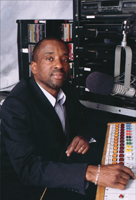 Gospel radio sensation Brother Milton “Steve” Satterfield passed on Thursday, January 14, 2010, at the VA Medical Center in Durham, N.C. after battling a lengthy illness. Gospel radio sensation Brother Milton “Steve” Satterfield passed on Thursday, January 14, 2010, at the VA Medical Center in Durham, N.C. after battling a lengthy illness.
Steve was a volunteer announcer for many years at WNCU 90.7 fm. He was host of gospel program, Precious Memories, which aired Sunday mornings from 6:00 a.m. -9:00 a.m.
A wake and “musical celebration” will be Tuesday, January 19, 2010, 6 to 8 p.m. at Union Baptist Church, 904 N. Roxboro St., Durham, N.C.
Homecoming services are scheduled for Wednesday, January 20, 2010 at 2 p.m. at Union Baptist Church, 904 N. Roxboro, St., Durham, N.C.
Funeral arrangements are entrusted to Burthey Funeral Home of Durham, N.C.
Family will take visitors at 3405 Gibson Rd, Durham, N.C.
Posted in Music News | 2 Comments »
Friday, January 15th, 2010
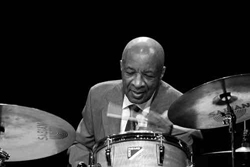 Ed Thigpen, drummer with the Oscar Peterson Trio during the famed jazz pianist’s popular early-’60s period, died on Wednesday, January 13, at the age of seventy-nine. Besides appearing on dozens of albums with Peterson, Thigpen recorded and performed with many other jazz greats, such as Ella Fitzgerald, Kenny Drew, Johnny Hodges, John Coltrane, and Dinah Washington, as well as pop artists including Johnny Mathis, Pat Boone, Peggy Lee, and k.d. lang. Ed Thigpen, drummer with the Oscar Peterson Trio during the famed jazz pianist’s popular early-’60s period, died on Wednesday, January 13, at the age of seventy-nine. Besides appearing on dozens of albums with Peterson, Thigpen recorded and performed with many other jazz greats, such as Ella Fitzgerald, Kenny Drew, Johnny Hodges, John Coltrane, and Dinah Washington, as well as pop artists including Johnny Mathis, Pat Boone, Peggy Lee, and k.d. lang.
He also released a number of albums as a leader, his last being 2004’s #1. Thigpen was a renowned drumming educator, most recently teaching at the Rhythmic Music Conservatory in Copenhagen, Denmark, where he had made his home since 1972. He was the author of the popular tutorial book Rhythm Brought To Life and, as a well-known master of brush playing, the creator of the DVD The Essence Of Brushes. Thigpen was the inspiration for signature brush, stick, cymbal, and practice pad models from Regal Tip, Sabian, and Remo. For more news visit www.edthigpen.com.
Photo by Nicola Fasano
Posted in Music News | 9 Comments »
Friday, January 1st, 2010
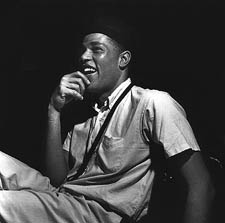 Dexter Keith Gordon was born on February 27, 1923 in Los Angeles, C.A. His father, Dr. Frank Gordon, was one of the first African-American doctors in Los Angeles who arrived in 1918 after graduating from Howard Medical School in Washington, D.C. Among his patients were Duke Ellington and Lionel Hampton. Gordon”s mother, Gwendolyn Baker, was the daughter of Captain Edward Baker, one of the five African-American Medal of Honor recipients in the Spanish-American War. He is considered to be the first musician to translate the language of Bebop to the tenor saxophone. Dexter Keith Gordon was born on February 27, 1923 in Los Angeles, C.A. His father, Dr. Frank Gordon, was one of the first African-American doctors in Los Angeles who arrived in 1918 after graduating from Howard Medical School in Washington, D.C. Among his patients were Duke Ellington and Lionel Hampton. Gordon”s mother, Gwendolyn Baker, was the daughter of Captain Edward Baker, one of the five African-American Medal of Honor recipients in the Spanish-American War. He is considered to be the first musician to translate the language of Bebop to the tenor saxophone.
Gordon began his study of music with the clarinet at age 13, then switched to the alto saxophone at 15, and finally to the tenor saxophone at 17. He studied music with Lloyd Reese and at Jefferson High School with Sam Browne. In his last year of high school, he received a call from alto saxophonist Marshall Royal asking him to join the Lionel Hampton Band. He left Los Angeles with the band, traveling down south and learning to play from fellow band members Illinois Jacquet and Joe Newman. In January 1941, the band played at the Grand Terrace in Chicago for six months and the radio broadcasts made there were Dexter’s first recordings.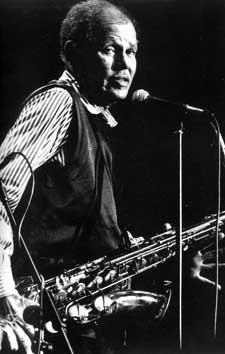
It was in 1943, while in New York City with the Hampton band, that Gordon sat in at Minton’s Playhouse with Ben Webster and Lester Young. This was to be one of the most important moments in his long musical career as, as he put it, “people started to take notice.” Back in Los Angeles in 1943, he played mainly with Lee Young (Lester Young’s brother) and with Jesse Price plus a few weeks with the Fletcher Henderson Orchestra. In 1944, he worked with Louis Armstrong ‘s orchestra which was one of the highlights of his careers. Being in the company of the great trumpet master was inspiring and gave him insight into the world of music that he never forgot. It was during this period that Gordon made his first lengthy solo recordings as the leader of a quintet session with Nat “King” Cole as a sideman.
In 1944, Gordon joined the Billy Eckstine band, the source of many of the Bebop innovators of the time and many of the most prominent bandleaders in the future. He was surrounded nightly by Sarah Vaughan, Dizzy Gillespie, Fats Navarro, Sonny Stitt, Gene Ammons, Leo Parker, John Malachi, and other architects of the new music. He began to record for Savoy Records in 1945 with tunes such as Blow Mr. Dexter, Dexter’s Deck, Dexter’s Cuttin’ Out, Long Tall Dexter (none of which were named by the composer). These early recordings are examples of the development of his sound and his style which influenced many of the younger tenor players of that day, including Sonny Rollins and John Coltrane.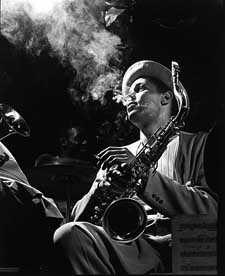
In 1976, Gordon enjoyed a hero’s welcome in the U.S. when he made his return engagement at Storyville in New York City with Woody Shaw, Louis Hayes, Ronnie Mathews, and Stafford James. He subsequently played the Village Vanguard, signed with Columbia Records, and was officially back in town. He organized his first working band during this period with George Cables, Rufus Reid, and Eddie Gladden. He considered this band to be his best band and he toured extensively with them and recorded Live at the Keystone (Mosaic) and Manhattan Symphonie (CBS Sony) with the group.
In 1986, Gordon moved into his new career, acting, in the motion picture Round Midnight which was directed by Bertrand Tavernier. He was nominated for an Academy Award for Best Leading Actor in 1986 for his portrayal of Dale Turner, a character based on the lives of Lester Young and Bud Powell. The music for the film won an Oscar for musical director, Herbie Hancock. The film included fellow musicians Bobby Hutcherson, Billy Higgins, Cedar Walton, Freddie Hubbard, Tony Williams, Pierre Michelot, John McLaughlin, and Wayne Shorter. His last major concert appearance was with the New York Philharmonic in Ellingtones, a concerto written for him by acclaimed composer David Baker and conducted by James de Priest.
Gordon died on April 25, 1990 in Philadelphia, P.A.
Posted in Artist of the Month | 4 Comments »
Monday, December 21st, 2009
December 24 and 25th – all holiday jazz during the day. Bob Parlocha..all holiday music overnight on the 25th.
December 25 – holiday jazz all day, then from 7-9pm-re broadcast of the NCCU/WNCU 2nd annual holiday bash.
December 25 from 9pm-10pm – Jazz Piano Xmas XX from NPR
December 26 at 9pm – Can’t Quit the Blues-a special on Buddy Guy
December 27 from 7pm-10pm -The Man and his Music-Count Basie- 3 part series on Count Basie-from NPR’s Jazz Profiles
Descriptions:
WNCU/NCCU holiday bash rebroadcast: originally aired on Friday Dec. 4th. NCCU Jazz Faculty Group plays holiday jazz from 7-9pm, Dec. 25th.
Jazz Piano Xmas XX: Dec. 25-9pm
This ever popular program will include original interpretations of holiday classics and duo combos performed by Dr. Billy Taylor, Ramsey Lewis, Patricia Barber, Eldar, and Robert Glasper. Felix Contreas hosts.
Buddy Guy-Can’t Quit the Blues: Dec. 26-9pm
Hosted by journalist Anthony DeCurtis, this program also features 15 classic tracks from throughout Guy’s career. Buddy Guy tells his own story, looking back on his life and career as only he can. He begins the story with his poor, sharecropping roots in Lettsworth, LA, and guides up through all his stops along the way to the Rock & Roll Hall of Fame – the first time he met the blues on a John Lee Hooker record, the birth of his trademark guitar style while regularly jamming for customers at a gas station, his explosion on the Chicago blues scene, his influence on many of rock’s great guitarists (Clapton, Hendrix, Stevie Ray Vaughn, Rolling Stones, John Mayer and many more), and much more.
Throughout “Can’t Quit the Blues,” Buddy Guy opens up and reveals himself as a man with a soul as great as his musical skills. He is extremely grateful to all those who helped him along the way, and always happy to share his knowledge with those inspired by him. At 70 years-old, he continues to live a great life, always thankful of how he came to be one of the world’s great blues guitarists.
“If I had my life to live over,” he says, “I would come back the same road that I came and pick up the acoustic guitar and hope to make somebody happy and smile.”
Count Basie: The Man and His Music: Dec. 27th7-10pm
Part 1: The 1st installment traces Basie’s early years; his childhood, his pilgrimage to Harlem,his relationship with Fats Waller, and his early life as a traveling musician with Katie Krippen and her Kitties, Walter Page and the Blue Devils, and Jimmy Rushing.
Part 2: The story picks up with the death of Benny Moten and the genesis of Count Basie’s first band at the Reno Club in Kansas City. Broadcasts on experimental station W9XBY bring Lester Young and others to Kansas City to see the band they had heard on the radio. Thanks to the addition of Young and the All-American rhythm section, the Basie band bursts onto the national scene. Basie comes to New York with an uncertain reception and then breaks through with his first record contract with Decca. This installment covers a period that marks the both the pinnacle of success for Basie’s Kansas City style and also some setbacks, including the death of tenor man Herschel Evans, the recording ban of the early 1940s, and the advent of World War II.
Part 3: In the 1940s, the bandleader found himself staring at the impending decline of the Swing Era. But the sophisticated groups he put together in the years to come started a musical renaissance which helped confirm his place in jazz history.
Posted in Music News | 1 Comment »
Monday, December 21st, 2009
Rep. John Conyers (D-Michigan) just moved H.R. 894, “Honoring the 50th anniversary of the recording of the album `Kind of Blue’ and reaffirming jazz as a national treasure”. It will be voted on later today.
111th CONGRESS
1st Session
H. RES. 894
Honoring the 50th anniversary of the recording of the album `Kind of Blue’ and reaffirming jazz as a national treasure.
IN THE HOUSE OF REPRESENTATIVES
November 5, 2009
Mr. CONYERS (for himself, Mr. SCOTT of Virginia, Mr. GRIJALVA, Mr.
MCGOVERN, and Mr. ABERCROMBIE) submitted the following resolution; which was referred to the Committee on the Judiciary
————————————————————————
RESOLUTION
Honoring the 50th anniversary of the recording of the album `Kind of Blue’ and reaffirming jazz as a national treasure.
Whereas, on August 17, 1959, Miles Davis, Jimmy Cobb, Bill Evans, Wynton Kelly, Paul Chambers, John Coltrane, and Julian `Cannonball’ Adderley collaborated to record the album `Kind of Blue’;
Whereas `Kind of Blue’ ranks 12th on the list of the `500 Greatest Albums of All Time’ published by Rolling Stone magazine;
Whereas `Kind of Blue’ was recorded in 1959, the year Columbia Records declared `jazz’s greatest year’;
Whereas `Kind of Blue’ marked the beginning of the mass popularity of jazz in the United States;
Whereas in 2008, the Recording Industry Association of America awarded `Kind of Blue’ quadruple-platinum status, meaning 4,000,000 copies of the album had been sold;
Whereas in 2002, the Library of Congress added `Kind of Blue’ to the National Recording Registry;
Whereas `Kind of Blue’ was recognized as the bestselling record in the history of jazz;
Whereas 50 years after the release of `Kind of Blue’, MOJO magazine honored the Legacy Edition of the album by giving it the `Best Catalogue Release of the Year’ award;
Whereas `Kind of Blue’ both redefined the concept of jazz for musicians and changed the perceptions of jazz held by many fans;
Whereas today, the sole surviving member of the Miles Davis Sextet, Jimmy Cobb, is performing and touring with his So What Band in tribute to the 50th anniversary of `Kind of Blue’; and
Whereas `Kind of Blue’ continues to be the standard masterpiece of jazz for American musicians and audiences: Now, therefore, be it
/ Resolved,/ That the House of Representatives–
- honors the 50th anniversary of `Kind of Blue’ and recognizes the unique contribution the album has made to American jazz;
- directs the Clerk of the House of Representatives to transmit enrolled copies of this resolution to Columbia Records;
- encourages the United States Government to take all appropriate steps to preserve and advance the art form of jazz music;
- recommits itself to ensuring that musical artists such as Miles Davis and his Sextet receive fair protection under the copyright laws of the United States for their contributions to culture in the United States; and
- reaffirms the status of jazz as a national treasure.
Posted in Music News | 7 Comments »
Wednesday, December 9th, 2009
 He tried his hand at the cello. He went out for the football team in Hope Mills, N.C., but he says he was awful at both. Twenty-three-year-old Steven Moore found his “wow” with the trumpet in North Carolina Central University’s jazz studies program. Moore will graduate with the class of 2009 on December 12. He tried his hand at the cello. He went out for the football team in Hope Mills, N.C., but he says he was awful at both. Twenty-three-year-old Steven Moore found his “wow” with the trumpet in North Carolina Central University’s jazz studies program. Moore will graduate with the class of 2009 on December 12.
“My father played the trumpet. But it wasn’t until I heard the Miles Davis CD Kind of Blue that I knew. I played that cut over and over,” says Moore. He was like the old adage about a duck taking to water. “I got involved, playing in honors bands. I played in the first annual All-State Band Festival for Jazz.” Then a family friend suggested he meet Dr. Ira Wiggins, the director of NCCU’s Jazz Studies program.
“Steven Moore has a gift in the manner in which he composes and performs music in the jazz idiom. At his age, he is further along in his musical development than many of his peers,” says Wiggins. “His style of trumpet playing is reminiscent of Clark Terry and Freddie Hubbard and with continual study and training, Steve will become a master artist in his own right.”
In the past year, Moore performed with fellow musicians at the legendary Newport Jazz Festival in Rhode Island and the Detroit Jazz Fest in Michigan. He has studied with NCCU’s artist-in-residence, Branford Marsalis. “Studying with him was transforming. He took me back to the roots of music. He had me listen to tons and tons of Louis Armstrong recordings, and you can’t get any better than that,” Moore recalls.
Currently, Moore is a student teacher at Hillside High School. “There is a lot of talent at Hillside…it needs to be nurtured…for the kids to reach their potential,” he said. “They have a hunger.” Moore is trying to make up his mind about his future. He wants to go to graduate school and he wants to be a music educator.
Question Moore about jazz and he waxes almost lyrical. “Jazz is the truest form of therapy. It is a spiritual experience,” he says. “People consider baroque and classical music as serious. Why not jazz? Jazz musicians have to walk in two worlds—the sophisticated world and one foot in show biz.”
“Young musicians are the legatees of a huge tradition. The mission is to get jazz out there, pull in the masses. We have to produce the next Miles Davis, the next Picasso, or a John Coltrane,” maintains Moore.
Posted in Music News | 7 Comments »
|


 RESCHEDULED DATE: Saturday, February 6, 2010
RESCHEDULED DATE: Saturday, February 6, 2010 Gospel radio sensation Brother Milton “Steve” Satterfield passed on Thursday, January 14, 2010, at the VA Medical Center in Durham, N.C. after battling a lengthy illness.
Gospel radio sensation Brother Milton “Steve” Satterfield passed on Thursday, January 14, 2010, at the VA Medical Center in Durham, N.C. after battling a lengthy illness.
 Dexter Keith Gordon was born on February 27, 1923 in Los Angeles, C.A. His father, Dr. Frank Gordon, was one of the first African-American doctors in Los Angeles who arrived in 1918 after graduating from Howard Medical School in Washington, D.C. Among his patients were Duke Ellington and Lionel Hampton. Gordon”s mother, Gwendolyn Baker, was the daughter of Captain Edward Baker, one of the five African-American Medal of Honor recipients in the Spanish-American War. He is considered to be the first musician to translate the language of Bebop to the tenor saxophone.
Dexter Keith Gordon was born on February 27, 1923 in Los Angeles, C.A. His father, Dr. Frank Gordon, was one of the first African-American doctors in Los Angeles who arrived in 1918 after graduating from Howard Medical School in Washington, D.C. Among his patients were Duke Ellington and Lionel Hampton. Gordon”s mother, Gwendolyn Baker, was the daughter of Captain Edward Baker, one of the five African-American Medal of Honor recipients in the Spanish-American War. He is considered to be the first musician to translate the language of Bebop to the tenor saxophone.

 He tried his hand at the cello. He went out for the football team in Hope Mills, N.C., but he says he was awful at both. Twenty-three-year-old Steven Moore found his “wow” with the trumpet in North Carolina Central University’s jazz studies program. Moore will graduate with the class of 2009 on December 12.
He tried his hand at the cello. He went out for the football team in Hope Mills, N.C., but he says he was awful at both. Twenty-three-year-old Steven Moore found his “wow” with the trumpet in North Carolina Central University’s jazz studies program. Moore will graduate with the class of 2009 on December 12.